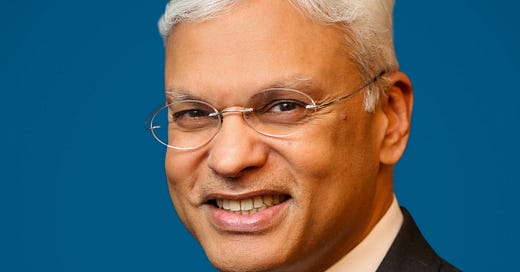Amid the kaleidoscopic changes testing and recasting the post-1945 liberal world order, none is more significant—and consequential—than the ascent of India.
India and the United States have long maintained a unique relationship. Each nation is a post-colonial power. Each achieved independence from Great Britain after protracted struggle. Each is a demographically diverse nation governed by a representative democracy.
Today, India is confronting a series of challenges:
—rising nationalist populism;
—financial and economic stresses amid ongoing growth;
—new international alignments, including with China, Russia, and other G-20 nations;
—rising nuclear competition with China and its impact on the global non-proliferation regime.
In this episode of the Serve to Lead podcast, renowned strategist Ashley Tellis discusses these and other major issues at this hinge moment in history.
Tellis’ new book, Grasping Greatness: Making India a Leading Power, is published by India Viking. The introduction—a brilliant, comprehensive synthesis—is available now, free-of-charge—in pdf.
About Ashley Tellis
Ashley J. Tellis is the Tata Chair for Strategic Affairs and a senior fellow at the Carnegie Endowment for International Peace, specializing in international security and U.S. foreign and defense policy with a special focus on Asia and the Indian subcontinent.
While on assignment to the U.S. Department of State as senior adviser to the undersecretary of state for political affairs, he was intimately involved in negotiating the civil nuclear agreement with India.
Previously he was commissioned into the U.S. Foreign Service and served as senior adviser to the ambassador at the U.S. Embassy in New Delhi. He also served on the National Security Council staff as special assistant to President George W. Bush and senior director for strategic planning and Southwest Asia. Prior to his government service, Tellis was senior policy analyst at the RAND Corporation and professor of policy analysis at the RAND Graduate School.
He is a counselor at the National Bureau of Asian Research, the research director of its Strategic Asia program, and co-editor of the program’s seventeen most recent annual volumes, including the latest Strategic Asia 2021–22: Navigating Tumultuous Times in the Indo-Pacific.
He is the author of Striking Asymmetries: Nuclear Transitions in Southern Asia (2022) and India’s Emerging Nuclear Posture (2001), the co-author of Interpreting China’s Grand Strategy: Past, Present, and Future (2000), and the co-editor of Getting India Back on Track (2014). Other significant publications include Revising U.S. Grand Strategy Toward China (2015, co-author), Balancing Without Containment: An American Strategy for Managing China (2014), Atoms for War? U.S.-Indian Civilian Nuclear Cooperation and India's Nuclear Arsenal (2006), India as a New Global Power: An Action Agenda for the United States (2005), Measuring National Power in the Post-Industrial Age (2000, co-author), and Stability in South Asia (1997). In addition to many more Carnegie and RAND reports, his academic publications have appeared in several edited volumes and peer-reviewed journals.
Tellis serves as an adviser to the Chief of Naval Operations. He is a member of several professional organizations related to defense and international studies including the Council on Foreign Relations, the International Institute of Strategic Studies, the United States Naval Institute, and the Navy League of the United States.
He earned his PhD in political science from the University of Chicago. He also holds an MA in political science from the University of Chicago and both BA and MA degrees in economics from the University of Bombay.
Image Credit | Author photo, Carnegie Endowment for International Peace.















Share this post